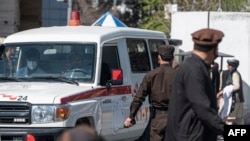Taliban authorities in Afghanistan said Monday that a suicide bomb blast outside the foreign ministry in the capital, Kabul, killed at least six people and wounded many others.
Eyewitnesses told VOA the attack occurred near a security checkpoint as ministry employees were leaving their offices for home.
Taliban-appointed Kabul police spokesman Khalid Zadran said that three security personnel were among those wounded.
An Italy-run international humanitarian organization, known as EMERGENCY, confirmed that its nearby surgical center received 12 wounded patients, including a child, while two other victims were already dead on arrival.
The Islamic State terrorist group claimed responsibility for the deadly blast, the first such attack since the Muslim fasting month of Ramadan started last week in Afghanistan, the Reuters news agency reported.
Islamic State's regional affiliate, known as Islamic State-Khorasan, or IS-K, has claimed responsibility for almost all recent bombings in the country.
Monday's blast came a day after the Taliban, the sworn enemy of IS-K, announced their security forces had killed three key operatives of the terrorist group, among others, in a recent operation against their hideout in the northern Afghan province of Balkh.
The Taliban spy agency, known as the General Directorate of Intelligence, identified one of the slain militants as Mawlavi Zaiuddin, saying he was the group's so-called regional governor and the second highest ranked member of IS-K.
"If confirmed, this would be a significant blow to IS-K in Northern Afghanistan. The Taliban had committed in the Doha Agreement to fight IS-K. The removal of these ISIS leaders indicates that it is doing so," tweeted Zalmay Khalilzad, the former U.S. special envoy for Afghanistan, on Monday.
Khalilzad negotiated and signed the agreement in February 2020 in Qatar’s capital, Doha, with the then-insurgent Taliban, paving the way for the United States to withdraw all its troops from Afghanistan after 20 years of war. The deal binds the Taliban, who seized control of the country in August 2021 as all U.S.-led foreign troops exited, to prevent transnational terrorists from using Afghan soil as a sanctuary.
Taliban forces have routinely carried out operations against IS-K hideouts in Kabul and elsewhere in Afghanistan, killing several high-profile members of the group. But U.S. officials maintain the de facto Afghan authorities lack the ability to effectively counter the growing terror threat.
A top U.S. military commander said last week that IS-K had its sights set on the West and could launch an attack before the year is out.
Gen. Erik Kurilla, the head of U.S. Central Command overseeing U.S. troops in the region, told a congressional hearing that the terror group is closer to taking its fight beyond Afghanistan's borders.
"They can do external operations against U.S. or Western interests abroad in under six months with little to no warning," Kurilla said.
Taliban chief spokesman Zabihullah Mujahid rejected the U.S. assertions as "not true" and said IS-K militants "have already been reduced in ranks and suppressed" in Afghanistan.
"The interest of the U.S. officials in this matter and their grandiosity is aiding and abetting the ISIS insurgents, which should be stopped," Mujahid alleged.
Intelligence shared by member states for a U.N. report last month warned IS-K has anywhere from 1,000 to 3,000 fighters who have established cells in Kabul and the Afghan provinces of Kunar, Nangarhar, and Nuristan provinces, all of them sharing the country's border with Pakistan.




